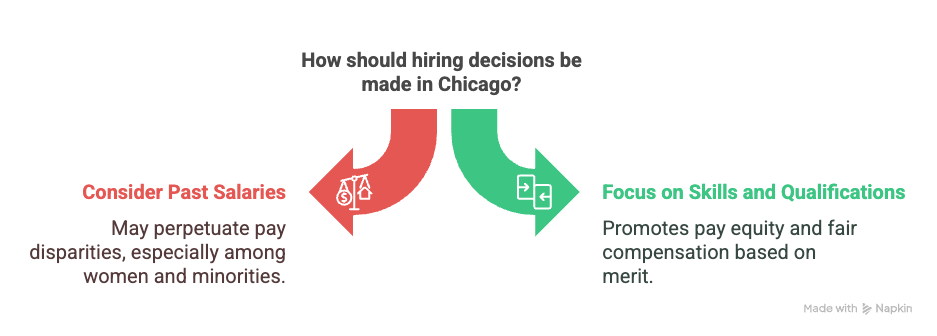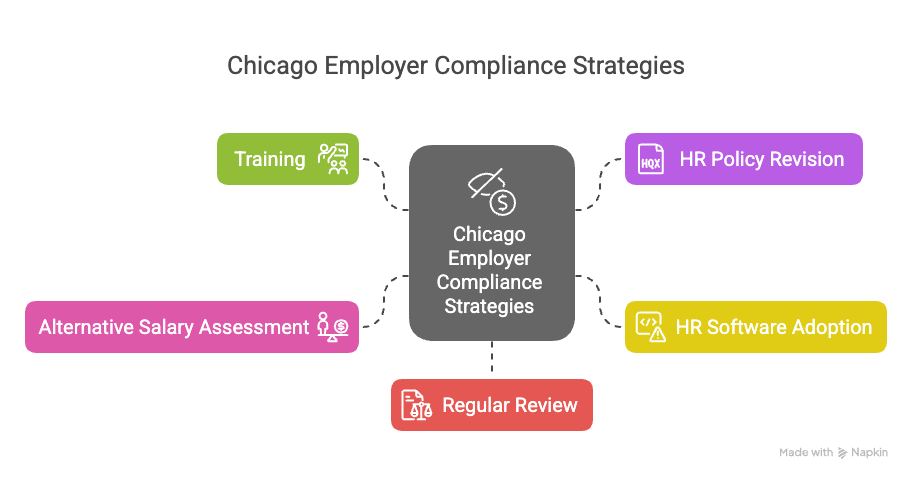Navigating the world of hiring in Chicago just got trickier for employers and excitingly favorable for job seekers thanks to the Chicago wage history ban. This legislation impacts how employers conduct background checks and emphasizes pay equity and fairness in the hiring process. Whether you're an employer striving for compliance or a candidate keen to know your rights, understanding this law is crucial. This guide will unpack everything you need to know, from the basics of the wage history ban to its implications for background checks and compliance strategies.
Key Takeaways
- The Chicago Wage History Ban prevents employers from asking about a job candidate's past salaries, encouraging equal pay by focusing on qualifications.
- Employers must adapt their background check processes by eliminating salary history inquiries to comply with the law.
- To adhere to the ban, businesses should train hiring managers, update HR policies, and use market data when determining salaries.
- The ban promotes pay equity, benefiting both employees and employers by fostering a fairer hiring environment.
- Challenges include finding new ways to set competitive salaries and ensuring ongoing compliance with evolving legal standards.
Introduction
The Chicago Wage History Ban marks a significant shift in hiring practices within the city. This legislation prohibits employers from asking job candidates about their previous salaries. The goal is to promote fair pay by eliminating historical pay discrimination. It is a response to long-standing concerns about wage inequality, particularly for women and minorities. By focusing on the candidatesâ qualifications rather than their past pay, the ban aims to create a level playing field.
This article delves into the changes brought by the ban and its effects on background checks. Employers need to understand these changes to ensure compliance. Likewise, employees should be aware of their rights under this law.
Understanding the Chicago Wage History Ban
Wage history bans are designed to stop employers from asking about or relying on an applicant's past pay in hiring decisions. The Chicago Wage History Ban aims to prevent discrimination based on previous salaries and promote pay equity among employees. By removing past salary considerations, employers should make offer decisions based on skills and qualifications, not prior compensation.

This ban isn't unique to Chicago. Similar laws are spreading across the U.S., all targeting the issue of pay inequality. These laws are rooted in the idea that using wage history to set pay often perpetuates existing disparities, especially among women and minorities. The Chicago Wage History Ban is part of a larger movement to create a more equitable job market by removing biases inherent in past salary inquiries.
The Chicago ordinance aligns with Illinois state law, which also prohibits asking about a candidate's pay history. Together, they strengthen the state's commitment to fair pay practices. Illinois pay equity laws aim to ensure that all workers receive equal pay for equal work, and the wage history ban is a critical component of these efforts. Understanding how these pieces fit together can help you navigate the hiring landscape in Illinois more effectively.
How the Ban Impacts Background Checks
The Chicago wage history ban brings a clear change to how background checks are conducted. Employers can no longer ask about past salaries during the hiring process. Any attempt to obtain this information directly or indirectly is off the table. Your strategy for background checks needs a careful overhaul.
First, forget about verifying salary history in Illinois. Shift the focus of your checks to areas like employment history and criminal records, where relevant. Lean on resources like the FTC Business Center for guidance on running checks without infringing on candidate rights. They offer practical tips for staying compliant with the law and respecting an applicant's privacy and rights.
Non-compliance doesnât just bring a slap on the wrist. Employers face penalties that can range from fines to potential lawsuits. The cost of violating the ban extends beyond moneyâyour companyâs reputation is also on the line.
To stay within legal boundaries, schools of thought need to evolve around privacy and fairness. This can mean restructuring internal procedures, including training your hiring team about what they can ask during interviews. Keep your operations aligned with the new laws by revising employment forms and instructions for background check processors. A proactive approach fosters compliance and ensures that your company remains a desirable place to work.
Chicago Employer Compliance Strategies
Creating a compliant hiring process in line with the Chicago wage history ban involves several practical steps. First, training is crucial. Ensure your hiring managers understand the new restrictions. Missteps often occur due to lack of awareness, so regular workshops on legal updates can help prevent errors.
Revise your HR policies. Remove any wage history questions from job applications and interview scripts. It's a straightforward change but essential for compliance. Instead, focus on a candidateâs skills and experiences relevant to the role. Look at job-related qualifications and market research when setting salaries. This approach aligns with the ban and supports equitable pay practices.
Consider adopting HR software that flags non-compliant practices. Many systems can alert you when certain questions are asked or documents are requested. By integrating technology into your hiring procedures, you can prevent accidental breaches.

Think about alternative ways to assess salary offers. Use market data, internal pay scales, and role-specific demands to guide compensation decisions. This not only respects the ban but also ensures that pay is competitive and fair.
Review these strategies regularly. Legal landscapes shift, and staying informed is key. By proactively adjusting your hiring practices, youâll maintain compliance and support fair pay.
Benefits of the Wage History Ban
The wage history ban offers clear benefits for employees and employers alike. For employees, it levels the playing field, fostering pay equity. By removing past salary figures from the hiring discussion, employees are evaluated based on their skills and potential rather than previous earnings. This assists in closing wage gaps and promotes fairness, especially for women and minorities who've historically faced pay discrimination.
For employers, while the adjustment may require some initial shifts in hiring practices, the benefits are substantial. Embracing the ban can enhance workplace morale. It shows a commitment to equitable treatment, which can strengthen a companyâs reputation as a fair employer. This attracts a diverse talent pool and reduces turnover, ultimately benefiting the bottom line. Employers that adapt to prioritize fair compensation are more likely to build a loyal and productive workforce.
Potential Challenges and Criticisms
Employers in Chicago face practical challenges with the wage history ban. One major issue is setting competitive salaries without historical pay data. Salary benchmarks often rely on prior wage information, so companies need to develop new strategies. Consider using industry standards, role-specific responsibilities, and regional pay ranges to guide compensation.
Another concern is the complexity of staying compliant. Employers must be vigilant, ensuring no salary history accidentally slips into conversations or paperwork. This demands rigorous training for hiring teams and thorough audits of HR practices.
Critics argue that the ban might not fully address pay inequity. Some believe that without addressing other systemic issues, like discrimination in hiring or promotion practices, the impact may be limited. Others worry it could lead to inflated salary demands, as candidates set expectations without any baseline.
Questions emerge on whether the ban disrupts traditional negotiation dynamics. Can it level the playing field or create new imbalances? Both sides need clear guidelines and open communication to navigate these new waters smoothly.
Conclusion
The Chicago wage history ban reshapes how hiring processes are conducted, focusing on fairness and equity. Employers must now navigate these changes carefully, ensuring background checks comply with the new norms. By embracing these adjustments, you help build a more equitable workplace, fostering trust and transparency. Take the initiative to review your hiring practices today. Stay informed and adapt to maintain a fair and compliant employment environment.
Resources
Visit our the GCheck blog for detailed insights into employment regulations and tips for navigating legal compliance in hiring practices. Here, we offer articles that break down complex topics into practical guides.
For additional resources on maintaining compliant background checks, the FTC Business Center provides comprehensive guidance. They cover everything from legal requirements to best practices for conducting background screenings within the boundaries of the law. This is an essential resource to ensure your hiring process aligns with current legal standards.
Frequently Asked Questions (FAQs)
Can employers ask about salary history in Chicago?
No, employers in Chicago cannot request or require your salary history as part of the hiring process.
How does the wage history ban affect job offers in Illinois?
The ban encourages employers to set salaries based on the job value and market rates, not on past salaries. This promotes fair and equitable pay.
Are background check companies allowed to share salary data in Chicago?
No, background check companies must comply with the wage history ban and should not disclose your past salary information to employers.
Whatâs the penalty for violating Chicagoâs wage history ban?
Employers who violate the ban may face fines and legal action. This underscores the importance of adhering to the law.
Do Illinois employers have to follow Chicagoâs law?
Yes, if they operate within Chicago. Illinois has a similar state-wide law, but Chicago's rules apply specifically within the city limits.
How to negotiate salary without past wage data in Chicago?
Focus on the job role, your skills, and market rates. Research comparable salaries for the position to make informed negotiations.
Can employers use public records to find salary history in Illinois?
No, employers should not seek out your salary history, even from public records, as it contradicts the intent of the law.
Does the ban apply to remote workers in Chicago?
Yes, if the remote work is for a Chicago-based employer, the law applies regardless of your physical location.
Are bonuses considered wage history in Chicago?
Yes, any previous bonuses are included in wage history and should not be requested by employers.
How to train HR teams on Chicagoâs wage laws?
Conduct workshops that cover the rules, provide examples of compliance, and update hiring practices accordingly.
Can you report an employer for violating the wage history ban?
Yes, complaints can be filed with the cityâs enforcement agency for investigation and action.
Does the wage history ban apply to promotions within the same company?
Yes, the ban applies to all positions, including promotions, within the same company.
Can an employer justify a salary offer by referencing averages from salary databases?
Yes, employers may use salary databases to determine fair compensation, provided itâs not based on your personal salary history.
Are there any exceptions to the wage history ban in Chicago?
Yes, if you voluntarily and without employer prompting, disclose your salary history, it may be considered. However, employers must not solicit this information.

GCheck Editorial Team
Meet the GCheck Editorial Team, your trusted source for insightful and up-to-date information in the world of employment background checks. Committed to delivering the latest trends, best practices, and industry insights, our team is dedicated to keeping you informed.
With a passion for ensuring accuracy, compliance, and efficiency in background screening, we are your go-to experts in the field. Stay tuned for our comprehensive articles, guides, and analysis, designed to empower businesses and individuals with the knowledge they need to make informed decisions.
At GCheck, we're here to guide you through the complexities of background checks, every step of the way.






